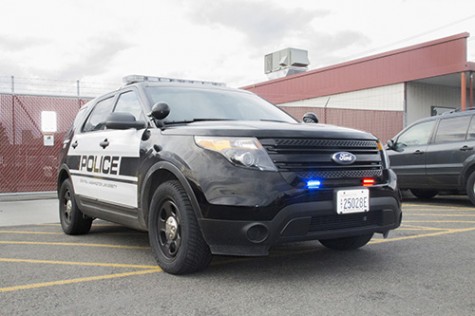Central Police cracks down on campus crime
November 7, 2014
Like most other college universities, Central deals with its share of student citations and complaints.
According to Richard DeShields, associate dean of student living, his department receives around 2,000 police reports concerning students, every year. These reports come from both on and off campus law enforcement.
Common reports include police citations, student injuries, public urination and alcohol citations involving minors. DeShields said that only around 300 reports involve alcohol, both on and off campus.

‘CUFFED – One of the many patrol vehicles Central police use.
Aside from the legal consequences students may face, DeShields said there are other reasons for students to consider their actions.
“We believe that our students are always ambassadors for the university,” DeShields said.
Students who are accused of committing a crime may be subject to actions taken by the university before the legal system has a chance to proceed.
“We’re very separate from the legal system,” DeShields said.
For most first-time offenses, students can expect a summons from DeShields.
At the meeting, students may be penalized with an eight-hour course relating to their behavior. A second violation could mean an off-campus assessment and a third can lead to a suspension.
DeShields said there are more serious crimes, such as sexual and physical assault; there are around nine to 15 per year. Such allegations may result in an immediate suspension from Central.
With the provided data, these more serious crimes are relatively rare compared to others. Often times, physical and sexual assaults may go unreported.
On the Central website, there is a link where students may ‘Report Behaviors of Concern.’
Capt. Jason Berthon-Koch, with the Central police department, said there are some common crimes his department deals with.
“I would have to say that the most common crime we deal with is theft,” Berthon-Koch said. “Theft is a crime of opportunity. It’s difficult for the police to be there at all times.”
Bike and book theft are particularly common. Central police operates a bike registration service which they encourage students to take advantage of.
Berthon-Koch said that Central’s alcohol violations are about on par with cities of similar demographics.
According to the Central police crime report, available on Central police’s web page, there have been 440 police responses between Oct. 1 and Oct. 30 this year.
These responses range from medical responses and theft, to tobacco violations, fraud and recovered items.
Not all of these responses end in a citation, and many of them were minor driving infractions. Others ended in citation or arrest.
“Most students make good decisions that don’t lead to those problems,” DeShields said.
DeShields believes that if students stop and think about the consequences of their actions, they will refrain from behaving negatively when they consider the effects it could have on the community and their neighbors within Ellensburg.
DeShields said around 25 percent of the crimes he sees are off-campus.
These can involve students walking home from bars, stealing from lawns, breaking items, littering, noise violations and public urination.
For these citations, community service may be involved as well as a program which educates students on community-campus relationships.


